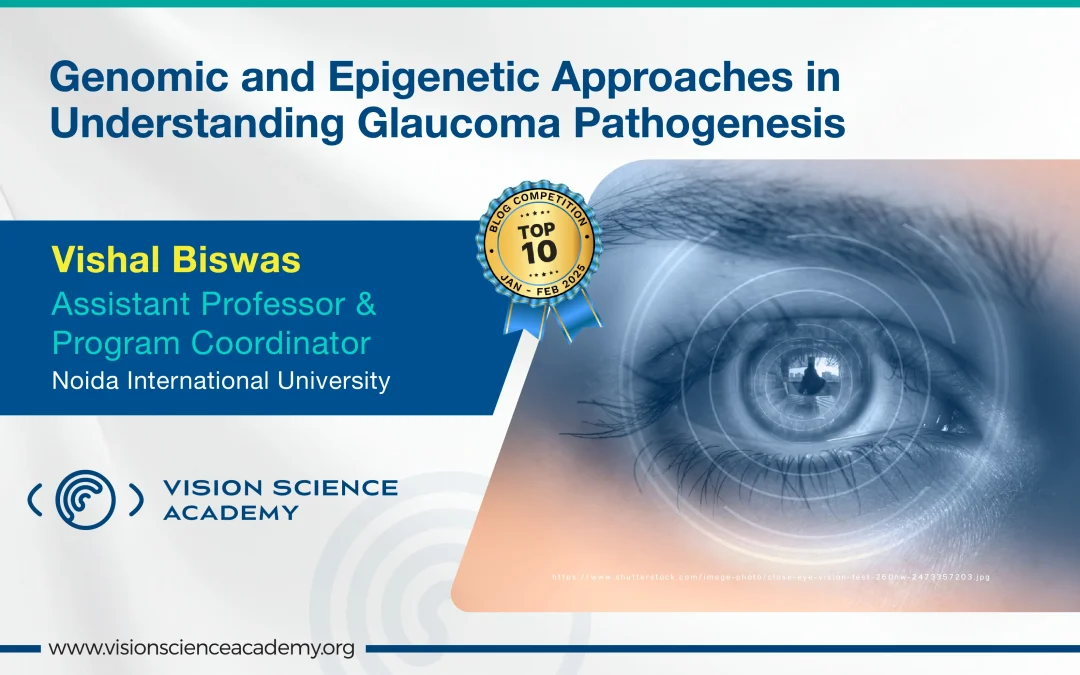Vishal Biswas, M.Optom.
Assistant Professor and Program Coordinator, Noida International University, Greater Noida, India
Glaucoma, a major cause of global blindness, stems from retinal ganglion cell damage. Advances in genomics and epigenetics have highlighted key genetic, environmental, and epigenetic factors in its pathophysiology.
Genomic Insights into Glaucoma
Genetic factors play a significant role in glaucoma onset, with various common and rare genetic variations linked to the condition. Genome-Wide Association Studies (GWAS) have identified numerous Single-Nucleotide Polymorphisms (SNPs) associated with Primary Open-Angle Glaucoma (POAG) and its subtypes. Common polymorphisms at 9p21 and 8q22 have been linked to heightened vulnerability to optic nerve degeneration in glaucoma. Moreover, certain genes such MYOC (myocilin), OPTN (optineurin), and CYP1B1 have been associated with Mendelian types of glaucoma, demonstrating that mutations in these genes might result in early-onset and hereditary instances of the condition. (1,2)
The genetic framework of glaucoma is varied, encompassing genes that participate in several biological processes, including extracellular matrix control, lipid metabolism, and cell adhesion. (1) MYOC mutations account for approximately 3-4% of Primary Open-Angle Glaucoma (POAG) cases associated with high intraocular pressure. Genetic research has enabled the development of targeted and personalised treatment approaches for glaucoma. (2)
The Role of Epigenetics in Glaucoma Pathogenesis
Epigenetic alterations and hereditary factors significantly contribute to the aetiology of glaucoma. These modifications in gene expression occur without DNA sequence changes and can be influenced by environmental factors. Key epigenetic mechanisms, like DNA methylation and histone changes, have been linked to glaucomatous processes.
DNA methylation, the process of attaching methyl groups to DNA molecules, is a significant epigenetic mechanism that regulates gene expression in glaucoma. Hypoxic conditions in the glaucomatous eye have been demonstrated to increase DNA methylation of genes linked to fibrosis and neuro-degeneration, hence leading to retinal ganglion cell death. (4) The modulation of the TGFβ (transforming growth factor beta) signalling pathway, recognised for its impact on extracellular matrix deposition, has been associated with alterations in DNA methylation in the setting of glaucoma. (4)
Histone alterations are key epigenetic mechanisms affecting gene expression in glaucoma. Changes like histone acetylation and methylation modify chromatin structure, impacting transcription factor access to DNA. This influences the preservation of optic nerve integrity. Research indicates that inhibiting histone deacetylases (HDACs) could be a promising therapy to prevent retinal ganglion cell (RGC) death.
Furthermore, non-coding RNAs, such as microRNAs (miRNAs) and long non-coding RNAs (lncRNAs), have been recognised as crucial regulators of gene expression implicated in glaucoma pathogenesis. These RNA molecules can engage with target genes to regulate their expression, influencing processes such as apoptosis and inflammation in the eye. (4) For example, miRNAs have demonstrated the ability to modulate genes linked to intraocular pressure and optic nerve integrity, underscoring their potential as therapeutic targets for glaucoma management. (4)
The integration of genomic and epigenetic approaches in glaucoma research can improve disease understanding and treatment strategies, leading to personalised medicine models and the identification of biomarkers for early detection and prognosis. (2)
Conclusion
Genomic and epigenetic discoveries have greatly advanced our understanding of glaucoma, revealing key mechanisms behind its onset and progression. These insights pave the way for earlier diagnosis, targeted therapies, and personalised treatment, offering hope for improved outcomes and vision preservation.
References
- Wiggs JL. Glaucoma genes and mechanisms. Progress in molecular biology and translational science. 2015 Jan 1;134:315-42.
- Moroi SE, Raoof DA, Reed DM, Zöllner S, Qin Z, Richards JE. Progress toward personalized medicine for glaucoma. Expert review of ophthalmology. 2009 Apr 1;4(2):145-61.
- Feng L, Wang C, Zhang C, Zhang W, Song W. Role of epigenetic regulation in glaucoma. Biomedicine & Pharmacotherapy. 2023 Dec 1;168:115633.
- D’Esposito F, Gagliano C, Bloom PA, Cordeiro MF, Avitabile A, Gagliano G, Costagliola C, Avitabile T, Musa M, Zeppieri M. Epigenetics in Glaucoma. Medicina. 2024 May 29;60(6):905.
- Tonti E, Dell’Omo R, Filippelli M, Spadea L, Salati C, Gagliano C, Musa M, Zeppieri M. Exploring epigenetic modifications as potential biomarkers and therapeutic targets in glaucoma. International Journal of Molecular Sciences. 2024 Feb 29;25(5):2822.


Recent Comments